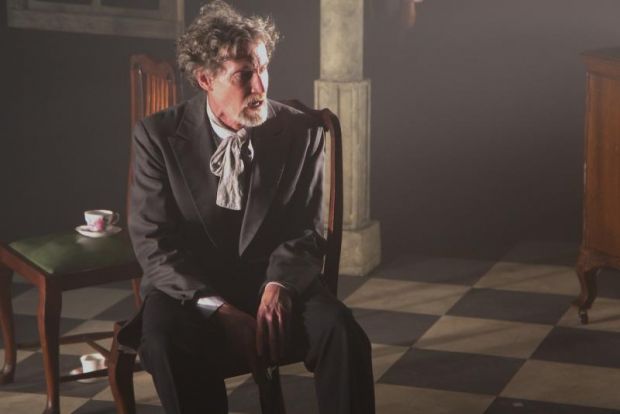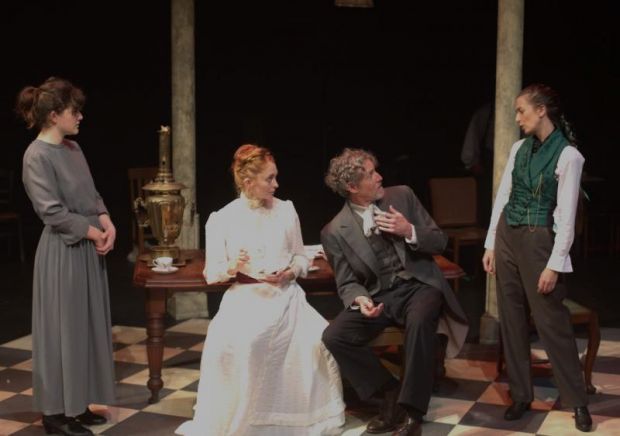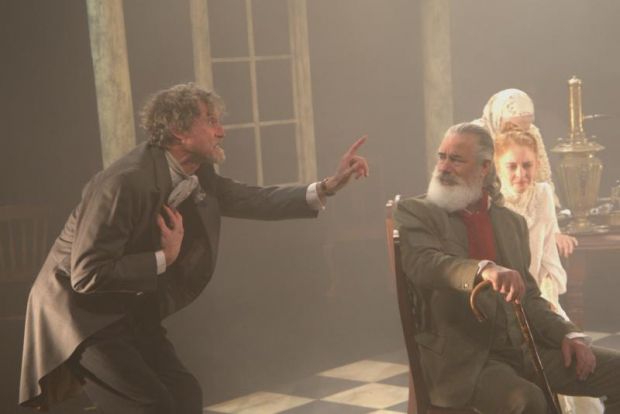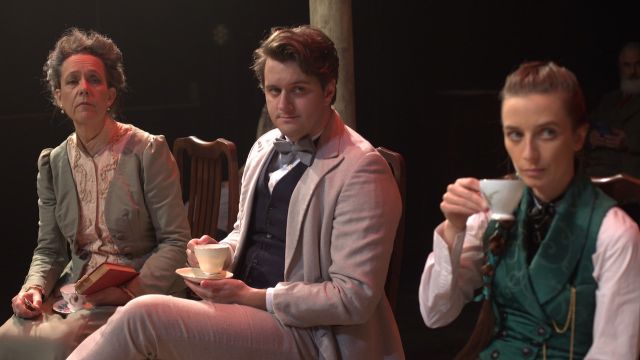Uncle Vanya
In Uncle Vanya – first produced in 1899 - Chekhov gives us a familiar cast of characters. They are stuck in a country house, stewing in thwarted hopes, burning resentments, complacent privilege, misdirected desires, and loquacious evasions. That’s not to say, ‘we’ve seen all this before’ – and in this production, it’s too individual, dynamic, incisive, and too funny for that. Apart from the old nurse, Maria (Clare Larman), the only honest character is Dr Astrov (Catherine Morvell), a medical doctor (like Chekhov himself) and an early environmentalist. She visits the sick and visits this household and her friend Vanya (Dion Mills). But Astrov is a solitary, alcoholic melancholic. In his clear-eyed way, Chekhov lets no one off the hook.
Vanya and his ‘plain’ niece Sonya (Alex Marshall) have run the estate for years, but all the money goes to Professor Serabryakov (Sebastian Gunner) and his much younger second wife Elena (Pia O’Meadhra). Vanya, the brother of the Professor’s first wife, is by now completely disillusioned with the Professor’s academic and artistic pretentions, and he’s had enough. Sonya knows she’s ‘plain’, but is carrying a hopeless torch for Astrov. She is, naturally, unaware of her feelings…

Director Bronwen Coleman and designer Harry Gill use the full depth of the Theatre Works space, which recedes into gloom – furnished with appropriate period furniture. Scenes play out on a shallow downstage strip, usually brightly lit by Sidney Younger. Cast not in a scene sit back in the gloom, clearly visible but clearly not – as in some recent productions – implicitly spectators – although there is always the sense that those on stage may be caught out by some intruder… which of course happens.
A disconcerting element is the casting of Catherine Morvell as Dr Astrov. As Coleman tells us in an interview, Morwell wanted the part, and Coleman thought, ‘Why not?’ As a result the (unresolved) love triangle – Vanya-Elena-Astrov – is ‘a queer one’. Yes, she is a woman, that’s so, and a female Astrov could be doctor in 1899, but would it play out like this in 1899? Morwell’s performance per se is decisive, authoritative and striking. She plays Astrov in male clothes with a long braid that falls to her waist, and strides about, hands in pockets, pretty butch. So, Astrov is a woman: it’s a statement, yes, but apart from the statement, what is the point vis à vis the play? The statement is enough.

What is Chekhov’s attitude to the characters in this comedy? A Russian friend at the interval told me, ‘He hates them.’ I feel more inclined to, ‘he is severely disappointed in them’, or maybe ‘he is angry with them.’ It is said that the best comedy comes out of anger, so, rather than a diatribe, Chekhov turns his anger with these characters into comedy that is close to satire. His anger is at these characters’ do-nothing stasis even as they endlessly whine about their fate.
Pia O’Meadhra as Elena absolutely gets the comedy. A ‘beautiful woman’, stuck in a marriage to a professor much older than her and whom she now realises is a selfish, boring old fart. She has no interest in his work – if she ever did. Vanya falls for her, eulogises her as a ‘water sprite’, because she’s beautiful and, well, there – and too bad for him she’s attracted to Dr Astrov. She could be a tragic figure, but when she weeps it’s more from self-pity than insight. When Astrov very seriously attempts to explain to Elena the environmental devastation of the surrounding forests and wildlife – Astrov’s real passion – Elena is palpably bored to death. It’s one of the funniest – and most revealing – scenes of the evening. (The contemporary resonance could not be clearer.) Elena is essentially an airhead, and much as she may sigh and complain, she’s not going anywhere – and never was.

Dion Mills also gets it right; he brings out most sharply in flights of rhetoric the comedy of futile resentment, of despair, of sexual frustration, and of being blandly exploited. What does he do about it? He gets a pistol and shoots – twice – and misses. We could weep at the pathos of this, but Chekhov is more bracing: he makes us laugh at this man who could have been more than he is. There is not a hint of sentimentality here. At the end of this production, it is no wonder Vanya weeps (we don’t) and that Sonya retreats into the comforts of the afterlife. Like any good sit-com, nothing has changed.
Michael Brindley
Photographer: Mikhaela Ebony
Subscribe to our E-Newsletter, buy our latest print edition or find a Performing Arts book at Book Nook.

